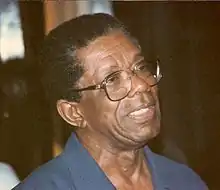Hein Eersel
Christiaan Hendrik "Hein" Eersel (born 9 June 1922) is a Surinamese linguist and cultural researcher.[1]
Hein Eersel | |
|---|---|
 Eersel in 1986 | |
| Minister of Education and Population Development | |
| In office 5 March 1969 – 20 November 1969 | |
| Prime Minister | Arthur Johan May |
| Personal details | |
| Born | Christiaan Hendrik Eersel 9 June 1922 Paramaribo, Surinam |
| Occupation | linguist |
He served as Minister of Education and Population Development in the cabinet of acting Prime Minister Arthur Johan May. He was also the first chancellor of the University of Suriname.[2]
Early life
Eersel was born in Paramaribo on 9 June 1922.[1] He passed the assistant teacher certification exam in 1942,[3] and the head teacher certification exam in 1949.[4] In 1950, he traveled to the Netherlands, where he studied Dutch language and literature at the University of Amsterdam.[5] He completed his candidate diploma in 1956,[6] then a doctorandus.[1] While in Amsterdam, he joined the organisation Wie Eegie Sanie (Our Own Things), founded by Surinamese students to promote the Sranan Tongo language and Surinamese culture.[7]
Eersel married Florence Louise "Floor" Beck,[8] and they had two daughters: Marthelise and Rachel.[9][10]
Career
Eersel returned to Suriname in 1959, and began teaching at the Suriname Kweekschool (Teacher Training College).[11] He later helped to establish the Institute for Teacher Training in Paramaribo.[12] He was director of the Taalbureau and the Bureau Volkslectuur (Public Literacy Bureau) from 1960 to 1969.[13]
In 1968, he became the first chancellor of the University of Suriname, and was also a lecturer in linguistics until his retirement in 1988.[13] He worked with Max Sordam to publish a full dictionary of Sranan Tongo in 1985.[14]
Eersel remained active with NAKS as of 2020, leading the Sranan Grammar Group.[15]
Writing
Eersel edited Johanna Schouten-Elsenhout's first published poetry book, Tide ete (1963).[16]
Eersel wrote a stage adaptation of Beaumarchais' The Barber of Seville, which opened at the Thalia Theatre in Paramaribo in 1960. While Noni Lichtveld's costumes and staging kept the original setting in 18th-century Spain, Eersel adapted some of the jokes and figures of speech for the local audience. A newspaper review noted that Eersel "put a few genuine Surinamese expressions in the mouth of our barber".[17]
The Nijmegen Institute for Missiology published a festschrift for Eersel's 80th birthday.[18] He had previously researched the history of Bible translations into Sranan Tongo.[19]
Honours
Eersel received an honorary doctorate from the Faculty of Social Sciences at the University of Suriname in 2003. He also received the Gazon Matodya Award in 2009.[2] In 2013, he was made a Grand Officer of the Honorary Order of the Palm.[20]
At the suggestion of the Henri Frans de Ziel Foundation, the Gemenelandsweg street in Paramaribo was renamed in Eersel's honour after a 2019 extension.[21]
References
- "Onze nieuwe Ministers". Vrije Stem (in Dutch). 16 March 1969. p. 1. Retrieved 26 January 2022 – via Delpher.
- Fernald, Ivan (18 November 2020). "Coryfeeën van weleer, tijdvak 1963- 1993 (3)". Starnieuws (in Dutch). Retrieved 14 April 2022.
- "Onderwijsexamens". De West (in Dutch). 21 October 1942. p. 3. Retrieved 26 January 2022 – via Delpher.
- "Onderwijs examen". De Surinamer (in Dutch). 24 September 1949. p. 2. Retrieved 26 January 2022 – via Delpher.
- "K.N.S.M. Komen en gaan". Het Nieuws. 27 October 1950. p. 3. Retrieved 26 January 2022.
- "Academische examens". Het Parool (in Dutch). 24 March 1956. p. 5 – via Delpher.
- Roos-Marie Tummers (15 December 1989). "Het leven op de achtererven". NRC Handelsblad. p. 20. Retrieved 26 January 2022.
- "Gevallen". Nieuw Suriname. 21 May 1959. p. 5 – via delpher.nl.
- "Hein Eersel 99 jaar vandaag". youtube.com (in Dutch). Ampie's Broadcasting Corporation. 9 June 2021.
- "Geboren". Het Nieuws. 8 May 1959. p. 2. Retrieved 26 January 2022.
- "Dr. Eersel verwacht". Het Nieuws. 2 February 1959. p. 3. Retrieved 26 January 2022.
- Ina van Wijngaarden (10 December 1988). "Sranan krijgt eindelijk de vrije ruimte". Het Parool. p. 30. Retrieved 26 January 2022.
- "Over de auteurs en samenstellers". Sranan : cultuur in Suriname (in Dutch). Chandra van Binnendijk, Paul Faber. Amsterdam: Koninklijk Instituut voor de Tropen. 1995. p. 157. ISBN 99914-0-049-4. OCLC 39182378.
{{cite book}}: CS1 maint: others (link) - Sordam, Max (1985). Sranantongo = Surinaamse taal : een korte inleiding tot het Sranantong[o], met uitgebreide woordenlijst. Ch.H. Eersel (1st ed.). Baarn: Bosch & Keuning. ISBN 90-246-4495-X. OCLC 781709778.
- Aveloo, Tascha (9 June 2020). "Hein Eersel 98 jaar: 'Een zeer deskundig man maar nooit belerend'". De Ware Tijd. Archived from the original on 12 August 2020 – via NAKS.
- van Kempen, Michiel (1993). "In memoriam Granmisi Elsenhout". De geest van Waraku (in Dutch). Haarlem/Brussel: Uitgeverij Zuid. pp. 203–205. ISBN 9789067730075. OCLC 66329044.
- "Thalia-Nieuws: De Barbier van Sevilla". Het Nieuws (in Dutch). 9 July 1960. p. 1. Retrieved 22 April 2022 – via Delpher.
- Bakker, Freek L. (2003). "Libi naga bribi: enkele aanzetten tot Surinaamse theologie". OSO. 22 (1): 127–129 – via DBNL.
- Eersel, Ch.H. (1991). "Bijbelvertalingen in het Sranan". OSO. 10: 48–56 – via DBNL.
- "Decoraties Suriname - Onderscheidingen Republiek Suriname". ere-onderscheidingen.gov.sr. Archived from the original on 12 February 2022. Retrieved 18 April 2022.
- "Verlengde Gemenelandsweg krijgt nieuwe naam". DE WEST (in Dutch). 13 November 2019. Retrieved 26 April 2022.